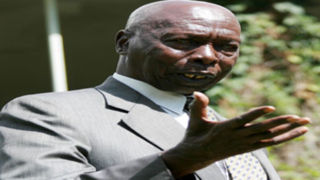
Former President the late Daniel arap Moi.
| File | Nation Media GroupNews
Premium
Ex-chief’s family claims Sh1bn in Moi succession suit
What you need to know:
- Moi allegedly grabbed the Cheluguis’ 53-acre land in Eldoret on September 21, 1983.
- The Judiciary and the Moi family have remained tight-lipped on what each family member is to get
The family of a former chief has threatened to stop the sharing-out of former President Daniel arap Moi’s assets unless money they won in a land battle with the former Head of State is factored in.
Ex-Chief Noah Chelugui’s family has joined the High Court suit in which the Mois are seeking to have lawyer Zehrababu Janmohammed appointed executor of the former President’s will.
The Cheluguis say in court papers the Mois should be stopped from appointing an administrator until they factor in the Sh1 billion that the ex-Chief’s widow was awarded in 2019 after a five-year legal battle.
Moi died on February 4, 2020 after a long illness.
Under Kenyan law, the family of a deceased person is required to file an application in court for the appointment of an administrator to execute the will. If the person died without a will, the family members can either agree on a sharing formula or let the courts decide how to share out the property.
Once the application for appointment of an administrator is filed, people with an interest in the deceased’s individual’s assets – including family members of creditors – are given time to raise any objections, which the court then uses to determine whether or not to approve the proposed executor.
If the proposed administrator is allowed to take over management of the estate, he or she provides a list of assets and debts the deceased left behind.
Land was allegedly grabbed
Moi allegedly grabbed the Cheluguis’ 53-acre land in Eldoret on September 21, 1983, before selling the prime property to the Jaswant Rai family.
In May 2019, High Court judge Antony Ombwayo ordered Moi and the Rai family-owned Rai Plywood to pay Chelugui’s family Sh1 billion for illegally taking over the land.
Moi challenged the compensation order at the Court of Appeal in Kisumu but died nine months later.
“Should this court confirm the said grant (of administration), justice will be defeated on our part as it will be difficult or even impossible to execute the judgment and/or enjoy the fruits of our litigation. We are rightful creditors to this estate and we are entitled to our share as decided by the Land and Environment court judge,” Mr David Chelugui, a son of the former chief, says in court papers.
The Cheluguis now say their award has grown to Sh2 billion on account of interest and legal costs, and should be factored in before an administrator is appointed to handle Moi’s succession.
“I do pray that this honourable court does set aside our share of Sh2 billion to cover the decree plus (legal) costs as we await the outcome of the appeal. In the meantime the confirmation of the grant should be put in abeyance and/or suspended until the estate has set aside the sum of Sh2 billion,” the junior Mr Chelugui adds.
Moi’s succession process has remained a jealously guarded secret between the former President’s family and court officers.
Demand for damages
Attempts by the Nation to access the court file in the past year have all been futile. Judiciary officials confirmed to our team on several occasions that only a handful of senior employees, mostly judges, can access the documents.
Rai Plywood told the High Court it bought the land from Moi in 2007 after doing a thorough search that showed there was no claim to the prime property by anyone other than the former President.
Chelugui’s 85-year-old wife Susan and son David sued Moi, Rai Plywood, the District Land Registrar, Uasin Gishu District, the Registrar of Titles and the National Land Commission in 2014.
The District Lands Registrar and Uasin Gishu District opposed a demand for damages from them, arguing they were “bound by orders from above by the first respondent (Moi)” in the alleged land-grab scheme.
Moi furnished the court with a title deed and white card but was unable to provide any proof of how he bought the land.
The former President and Rai Plywood insisted the suit was a claim for land veiled as a constitutional petition.
Had it been treated purely as a land case, it would have been time-barred because Kenya’s laws provide a 12-year window to sue for such a claim.
With constitutional petitions, however, a judge can overlook the time taken to bring the matter to court.






